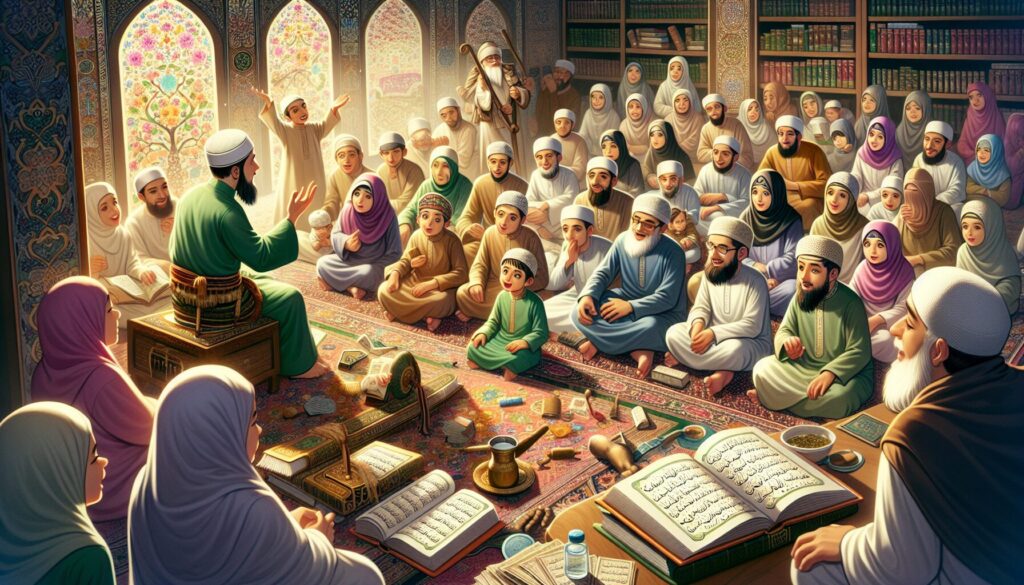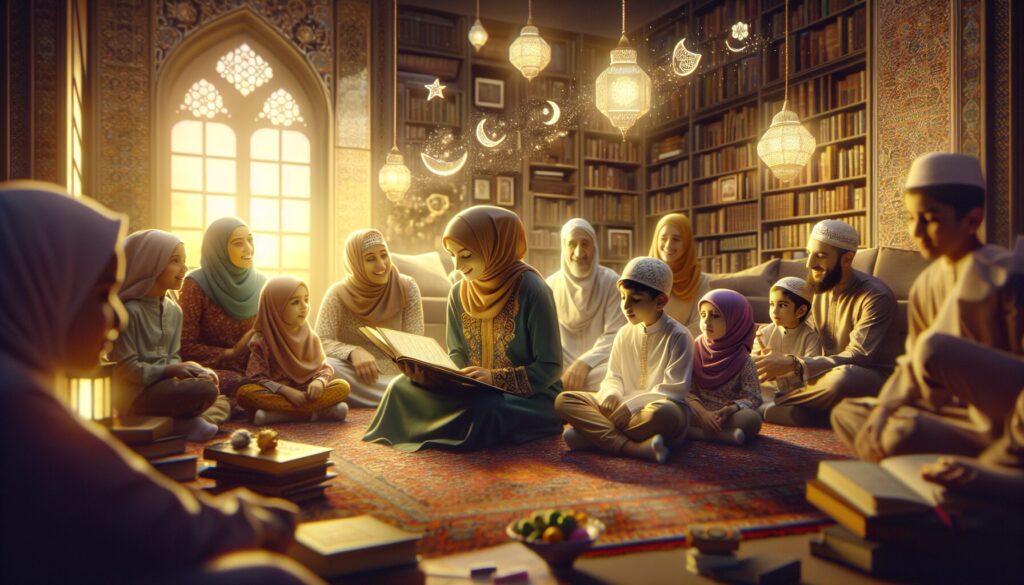I remember the first time I heard an Islamic story as a child. My grandmother, with her warm smile and twinkling eyes, would gather us around in the cozy living room of our home. She’d weave tales of wisdom and adventure that were not just stories but lessons wrapped in narratives. For communities in the UK, Islamic storytelling is a beautiful bridge connecting generations, blending cultural heritage and religious teachings. It’s about tales that inspire, educate, and bring communities together. These stories often revolve around themes of compassion, bravery, and faith, making them relatable and meaningful. Whether recounting the adventures of historical figures or moral lessons from the Quran, these stories carry a timeless charm, inviting listeners to reflect and grow.
Historical Roots of Islamic Storytelling

Islamic storytelling has a rich historical tapestry woven into the cultural fabric of the United Kingdom. Imagine walking through the vibrant streets of London or exploring the ancient alleyways of Edinburgh, where echoes of past stories linger. The journey of Islamic storytelling in the UK is fascinating and multifaceted, shaped by centuries of migration, cultural exchange, and evolving narratives.
Let’s dive into the historical roots! The arrival of Muslims in the UK dates back to the early 8th and 9th centuries, brought by traders and travelers. These early visitors shared their stories, infusing local narratives with new perspectives and ideas. Fast forward to the 19th and 20th centuries, when waves of immigrants from South Asia, the Middle East, and Africa arrived. They brought with them a treasure trove of tales that enriched the storytelling landscape.
One of the key milestones in this evolution was the establishment of vibrant communities in cities like Birmingham and Leicester, where mosques doubled as cultural hubs. Here, storytelling was not just a pastime but a powerful vehicle for education and community bonding. Storytellers would captivate audiences with tales of prophets, historical heroes, and moral lessons, creating a tapestry of narratives that resonated with both young and old.
The Role of Institutions and Organizations
Several organizations have played pivotal roles in preserving and promoting Islamic storytelling. For instance, The British Library hosts a remarkable collection of ancient Islamic manuscripts, providing a bridge between past and present. These manuscripts aren’t just relics; they are living testimonies to the enduring power of storytelling.
Moreover, institutions like The Islamic Foundation have been instrumental in educating new generations about Islamic culture and heritage. By organizing workshops and storytelling events, they ensure that the art of storytelling continues to thrive. These stories are more than just words; they are a means of connecting with one’s roots and understanding the world.
In today’s UK, Islamic storytelling is a dynamic blend of the traditional and contemporary. It finds expression in literature, theater, and even digital media, reaching wider audiences than ever before. This evolution reflects the adaptability and resilience of storytelling as a cultural practice.
Islamic storytelling in the UK is a testament to the country’s rich multicultural tapestry. It serves as a reminder that stories have the power to transcend boundaries, connect hearts, and inspire generations. By understanding and appreciating these roots, we can better appreciate the vibrant, diverse narratives that continue to shape the UK’s cultural landscape.
Significance of Storytelling in Islamic Culture
When I was a kid, my grandmother would gather us around her in the cozy living room and spin stories that transported us to a different world. Her tales were filled with moral lessons, wisdom, and a deep sense of community. This tradition of storytelling isn’t just cherished in my family; it’s a cornerstone of Islamic culture, especially for communities in the UK.
The significance of storytelling in Islamic culture can’t be overstated. It’s a powerful tool for preserving history, teaching moral lessons, and fostering a sense of identity. Stories have an extraordinary ability to connect us to our roots and keep traditions alive. In the context of Islamic storytelling in the UK, this art form serves as a bridge between generations, connecting the past with the present.
The Role of Storytelling in Community Building
Storytelling plays a crucial role in building and maintaining a sense of community. It’s not just about entertainment; it’s a way of bringing people together to share experiences and values. In cities like Birmingham and Leicester, community centers often host storytelling sessions where people of all ages gather to listen and learn. These events aren’t just fun; they’re vital for reinforcing community bonds and ensuring that cultural and religious knowledge is passed down.
Moreover, Islamic storytelling often highlights themes of resilience, justice, and compassion, which are universally relevant. These stories teach us to empathize with others and to act with integrity. It’s not just about the words; it’s about the lessons that linger long after the story has been told.
In educational settings, storytelling is also a valuable tool. Schools and libraries, like The British Library, incorporate Islamic stories into their programs to introduce children to different cultures and perspectives. This approach not only enriches the curriculum but also promotes inclusivity and understanding among young minds. For parents and educators looking to engage children further, exploring interactive storytelling options can be highly beneficial. Check out The Ultimate Guide to Interactive Islamic Storytelling for Kids: Engaging Narratives and Activities for more inspiration.
Through storytelling, we’re able to nurture a deep appreciation for our shared heritage and values. It’s a tradition that continues to thrive, adapting to new mediums while staying true to its core purpose. Whether it’s through a traditional oral narrative or a modern digital format, the heart of Islamic storytelling remains the same: to educate, inspire, and connect us all.
Key Themes and Narratives in Islamic Stories
Islamic stories are rich with universal themes that resonate deeply with audiences, especially here in the UK. They often explore concepts like justice, compassion, and the eternal struggle between good and evil. Remember when you were a kid and your grandparents would tell you stories that just *stuck*? Those narratives usually had a moral lesson, right? It’s similar with Islamic storytelling, where the lessons are not just for entertainment but for nurturing the soul.
One of the most prominent themes is the journey of self-discovery and personal growth. Characters in these stories often undergo significant transformations, guided by their faith and inner resolve. Take, for instance, the classic tale of the Prophet Yusuf. His story of resilience and integrity in the face of adversity is a timeless narrative that many find inspiring. It’s a saga of patience and perseverance, teaching us that even in the darkest times, faith can light the way.
The Power of Community and Unity
Another key theme is the power of community and unity. Islamic stories frequently emphasize the importance of coming together for the greater good. They often portray communities working collectively to overcome challenges. This aspect is especially relevant in today’s multicultural UK, where diverse communities come together to create a vibrant tapestry of cultures and traditions. It’s like when you see people from all walks of life gathering at a local mosque or community center, sharing not just space but also experiences and wisdom.
Moreover, the theme of forgiveness and redemption is recurrent in Islamic narratives. Characters often face moral dilemmas and must choose between vengeance and forgiveness. This is beautifully illustrated in the story of the Prophet Muhammad, who forgave the people of Mecca despite their past transgressions. Such stories serve as powerful reminders of the transformative power of forgiveness and the peace it brings into our lives.
In the UK, organizations like British Muslim Heritage Centre and The Islamic Foundation play a significant role in preserving and promoting these themes through various cultural events and educational programs. Their efforts help ensure that these timeless narratives continue to inspire and educate future generations.
Ultimately, Islamic storytelling in the UK is a tapestry of rich narratives that offer profound insights into the human experience. They provide timeless lessons that remain relevant, encouraging us to reflect on our own lives and the values we hold dear.
Influence of Islamic Storytelling in the UK

Islamic storytelling has left a vibrant mark on the UK’s cultural tapestry. It’s like adding a splash of color to an already diverse canvas. From bustling cities to serene countryside towns, the influence of these age-old narratives is evident in various forms, enriching the British cultural landscape with stories that resonate with timeless wisdom and moral lessons.
One of the most fascinating aspects is how Islamic storytelling weaves into modern British life. Take the British Muslim Heritage Centre, for example. They’re doing an incredible job of preserving and sharing these stories with a wider audience, ensuring that both young and old can appreciate their profound messages. This center is a treasure trove of knowledge, offering workshops, lectures, and exhibitions. It’s a must-visit for anyone curious about the blend of Islamic culture and British life.
Then there’s Birmingham’s annual Birmingham Literature Festival. Here, Islamic tales often find a platform among other global stories. These events provide an opportunity for people to come together, share, and celebrate the beauty of storytelling. It’s like being part of a big, warm family gathering where everyone has a story to tell and a lesson to learn.
Impact on Literature and Arts
Islamic storytelling has also seeped into British literature and arts, influencing both emerging and established authors. Writers often draw inspiration from the rich narratives of Islamic tradition, creating works that bridge cultural gaps and foster understanding. This fusion is evident in the growing number of novels and plays that incorporate Islamic themes and characters, offering fresh perspectives to readers.
Art galleries and museums, such as The British Library, frequently host exhibitions showcasing Islamic art and manuscripts. These displays not only highlight the beauty of Islamic calligraphy and illustration but also tell stories that captivate and educate visitors. It’s an artistic journey that takes you through centuries of history, all under one roof.
Theatre productions and performances have also embraced Islamic narratives, bringing them to life in new and exciting ways. Productions that adapt stories of Prophets or historical Islamic figures engage audiences and introduce them to a rich cultural heritage. This creative expression through performing arts keeps the stories alive, allowing them to be experienced in a dynamic and interactive manner.
In schools and universities across the UK, Islamic storytelling is studied and appreciated for its literary and cultural significance. Educational programs often include these narratives as part of their curriculum, encouraging students to explore and understand these stories within a broader historical and cultural context. This educational embrace ensures that Islamic storytelling remains an integral part of the UK’s diverse cultural heritage.
How to Engage with Islamic Storytelling
Engaging with Islamic storytelling in the UK is like opening a door to a world rich with history and culture. On a trip to the UK, I had the chance to attend a storytelling session at the British Muslim Heritage Centre and was amazed by how stories from centuries ago felt so relevant today. It was like sitting around a cozy campfire, listening to tales that warm the heart and ignite the imagination.
To deeply engage with Islamic storytelling, you might want to start by visiting local cultural institutions or events. The Birmingham Literature Festival often features sessions that delve into these narratives. It’s a fantastic opportunity to hear firsthand accounts and interpretations from knowledgeable storytellers.
Ways to Dive Into the Experience
Here are some ways you can immerse yourself in these captivating stories:
- Attend Live Storytelling Events: These events offer a unique chance to experience stories in their most vibrant form. Keep an eye on venues like the Leicester Central Library, which sometimes hosts these enriching gatherings.
- Explore Literary Festivals: Festivals are a treasure trove of storytelling sessions. They often feature discussions and performances that can give you a deeper understanding of the themes and contexts of the stories.
- Visit Local Libraries: Many libraries, such as The British Library, house collections that include Islamic storytelling literature. It’s a serene place to explore these tales at your own pace.
Additionally, joining book clubs that focus on Islamic literature can be a rewarding experience. These clubs often provide a platform to discuss stories and their impact on contemporary society. During that same visit, I was even able to join a local book club session, where a lively debate on Prophet Yusuf’s story led to new friendships and insights.
Moreover, connecting with community centers that focus on Islamic culture can open doors to workshops and storytelling sessions. These centers often have programs that highlight the importance of storytelling in preserving cultural heritage. They serve as a reminder of how stories transcend time, connecting us to the past while guiding us towards the future.
Engaging with Islamic storytelling in the UK isn’t just about listening; it’s about participating in a dialogue that enriches both the mind and soul. Whether through attending events or delving into books, these stories offer pathways to understanding and empathy. It’s a journey worth taking, filled with lessons and reflections that linger long after the last page is turned or the final word is spoken.
Conclusion
In essence, Islamic storytelling in the UK is a vibrant and integral part of the nation’s multicultural fabric, offering timeless narratives that educate, inspire, and connect individuals across generations. Through a dynamic blend of traditional and modern expressions, these stories continue to foster understanding and appreciation of Islamic culture, enriching the collective British experience. Whether through live events, literature, or community gatherings, engaging with these stories offers a profound opportunity to explore shared values and diverse perspectives. Keep the stories alive and flourishing!
Continue Exploring
Ready to nurture eco-consciousness and faith in your kids? Discover inspiring strategies and insights for raising green Muslim children in the modern world. Don’t miss out on this essential read for every forward-thinking parent!
Frequently Asked Questions
What is the significance of Islamic storytelling in the UK?
Islamic storytelling in the UK serves as a bridge connecting generations, blending cultural heritage with religious teachings. It provides a platform for community bonding, education, and preserving cultural identity, while its themes of compassion, bravery, and faith resonate deeply with audiences.
How has Islamic storytelling influenced British culture?
Islamic storytelling has enriched the British cultural landscape by incorporating its narratives into literature, theater, and digital media. It inspires new artistic expressions and fosters cultural understanding, evident in events like the Birmingham Literature Festival and exhibitions at institutions like the British Library.
How can one engage with Islamic storytelling in the UK?
To engage with Islamic storytelling in the UK, individuals can attend live storytelling events, explore literary festivals, visit libraries with collections of Islamic literature, and participate in book clubs or community center workshops focused on Islamic culture. These activities offer deeper insights into the stories and their cultural significance.
Fatima Ansari is an Islamic educator and writer with over a decade of experience teaching Quran and Islamic studies to children and families in Western Muslim communities. Growing up in North America, she saw firsthand the challenges Muslim families face in balancing faith with modern life, which inspired her to share practical guidance rooted in the Quran and Sunnah. Her mission with E-Quran Learning is to make Islamic education accessible, relatable, and inspiring for Muslim families across the United States, United Kingdom, Canada, Australia, and New Zealand.






